Why is my pet so itchy?
by Camille Virtucio, DVM

During summer time, we see a lot of skin issues both in dogs and cats. Once summer hits, veterinarians and staff expect an influx of itchy pets and frustrated owners asking for help to cure the scratching and discomfort of their pets. The pruritus (medical term for “itchy”) intensity can range from a focal area of scratching, and go as bad as nonstop itching where the pet cannot sleep anymore. Here are some information that can help you to demystify the case of the itchy pet:

The FLEAS.
This is one of the most common issues that can cause a pet to get itchy. There is a condition called “Flea Allergy Dermatitis” – an intense itching and redness that occurs on the skin due to a reaction from the flea bite and flea. saliva. Not all dogs or cats experience this, as allergy is an immune reaction that is individual specific. Regardless, pets should be thoroughly checked for fleas using a flea comb, and must be put on flea treatment and prevention.
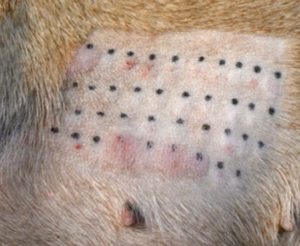
The big word: ALLERGY.
This is a very common word used in any itchy pet. However, the biggest question is: What is my pet allergic to? The gold standard diagnostic test to get this answer is called IDAT – intradermal skin test which is commonly done at the Veterinary Dermatologist’s office. Most general practitioners, such as myself, prescribe “band aids” that will help the pet get by as the pet continues to get exposed to the allergen. These are your allergy shots (steroid, Cytopoint), allergy pills (steroids, Apoquel, antihistamines), topical treatments (antibiotics + steroids, mousse, shampoos) and antibiotics that will help even out the skin flora. If food allergy is suspected, we do a hydrolyzed protein diet trial for 8 weeks. These tactics generally help a lot – however, if the pet doesn’t respond well to these approaches, then we usually refer the pet and client to a specialist. For me, there is a line where we should stop the band aids, and get a definite answer from a veterinarian with more training and tools.
Intradermal Skin Testing (IDAT)
HOTSPOTS
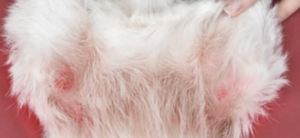
In a fancier medical term, we call this moist dermatitis. Moist dermatitis isn’t really a diagnosis, it is more of a description of how the dermatitis look like. The look moist because of constant scratching and trauma +/- infection. When hotspots are chronic and there is a lot of pus involved, I do recommend getting a sample to culture. This way, we can diagnose resistance early and avoid putting the pet in a roulette antibiotic that may or may not work. Also, resistant bacteria can be passed on to humans living in the house so there is some public health concern.
MITES and RINGWORM
These two are exclusive of each other. I just put them together since there is a PCR test for exposure and/or presence of these infectious agents that I always offer for my super itchy and chronically itchy patients. Dogs can get mites from other animals and can flare up when the immune system is not at its best. Ringworms, on the hand, ARE NOT WORMS. They are just called such because the skin lesion is round and looks like a worm in a circle. But in reality, Ringworm is a fungal infection that we always watch out for since this can be transferred to humans. This can cause intense itching in humans, and a usual problem when there are kids or older individuals whose immunity is not at its peak.
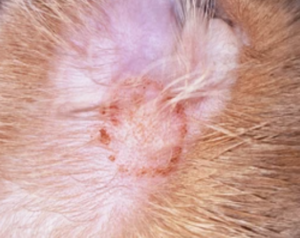
THYROID DISEASE

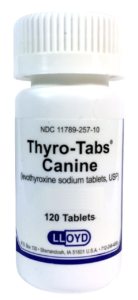
This issue is more common in dogs with Hypothyroidism. I have had a lot of skin issue patients which have been treated with all sorts of injectables, oral pills, topicals and special derm diets, but are still not doing well or the issue keeps on coming back. That’s why I always suggest checking the thyroid hormones with any dog that has skin issues. This way, we can address the internal issues at the same time that we are addressing the outside skin problems. Hypothyroid dogs have a slow metabolism and are not good in mounting good immune responses – that’s why the skin issues cannot fully heal and the haircoat struggles return to normal health.
HYPERACTIVE IMMUNE RESPONSE
This means that the body’s own cells are attacking the skin layers and causing sloughing off the protective barriers. This exposes the skin to bacterial and/or fungal infection and leads to discomfort and itching. This is usually an end point diagnosis where the most common reasons above had to be ruled out first. By gold standard, this is diagnosed via skin biopsy and sending the sample to a pathologist. Treatment involves strong immune suppressants that will slow down and control the “body attacking itself”.
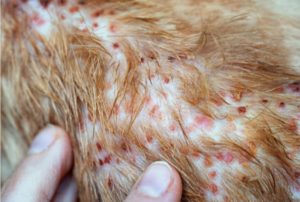
How to treat an itchy dog?
In general, the treatment approach is to:
- LIMIT SCRATCHING and self trauma through e-collars, donut cones, tshirts or onesies
- CONTROL SCRATCHING through prescription oral and injectable medications
- CONTROL SKIN INFLAMMATION through allergy shots, steroids and topicals
- Treat fleas, mites, fungal infection (if present). Decontaminate household and pet’s environment.
- Clean the wounds through medicated wipes
- Supplement skin moisture through topicals and omega capsules for faster healing
Ultimately, the diagnosis and treatment will depend on how willing you are, as a pet parent, to invest in getting answers. Some owners will go all in to get all the tests done; while some want to be more conservative, assess response to treatment and knock out one possible cause at a time. There is no proper way to do it. I prefer presenting my clients options and put them into perspective on what is worth their resources, depending on my medical assessment after physical exam.
Most owners of skin problem pets are already frustrated with the nonstop “band-aiding” – especially if the issue has been going on for years. If I see that it will be your money’s worth to see a specialist, I will refer the case and endorse to a dermatologist. Pet owners in Los Angeles are very lucky as we have quite a number of good pet skin doctors here.
I hope this article helped you understand how we veterinarians assess, diagnose and treat our itchy furry friends.
You are always more than welcome to discuss your concerns and thoughts to your veterinarian.
I understand skin issues can be tricky. Not to worry – We are here to help!


